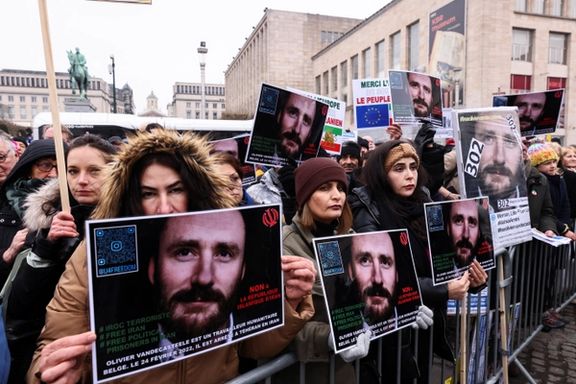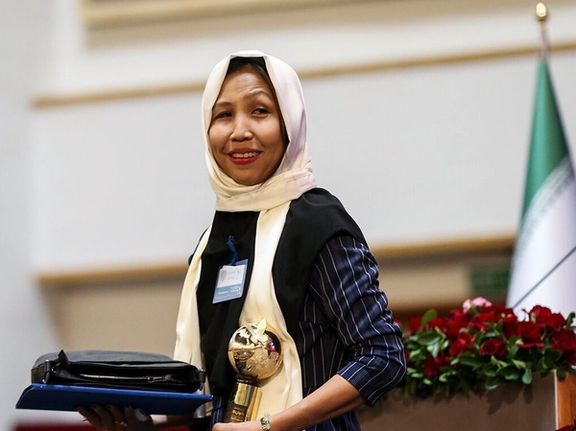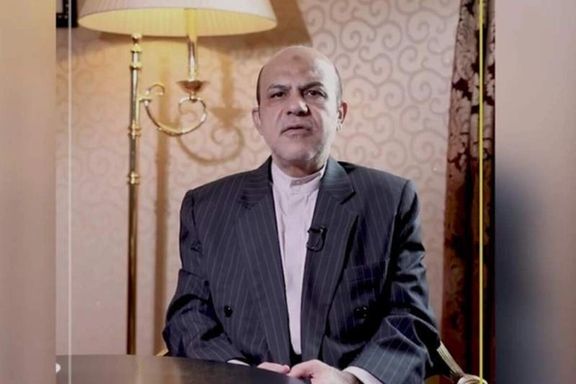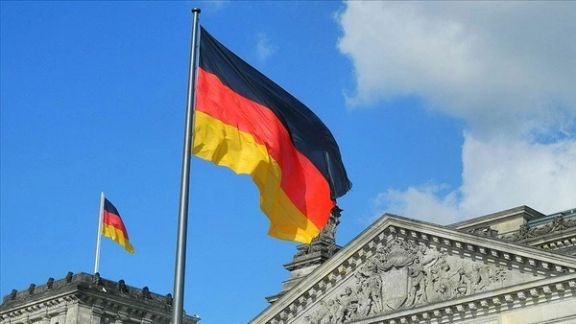Thousands Protest In Brussels Demanding Release Of Belgian In Iran

Thousands of people took to the streets of Brussels on Sunday to protest against the detention in Iran of Belgian aid worker Olivier Vandecasteele.

Thousands of people took to the streets of Brussels on Sunday to protest against the detention in Iran of Belgian aid worker Olivier Vandecasteele.
He was arrested last year and recently sentenced to a minimum 28 years in prison on charges including spying.
The Belgian government has said the charges are fake.
"His life is in danger, contribute to his freedom," "#Free Olivier Vandecasteele," read banners held by protesters who included Vandecasteele's family, friends and colleagues.
After Vandecasteele was sentenced last month, Belgium's justice minister said the Belgian had been imprisoned "for a fabricated series of crimes" and had been sentenced as retribution for a 20-year jail term Belgian courts imposed on an Iranian diplomat in 2021.
Belgium's constitutional court will next month hold a hearing on the legality of a Belgian prisoner exchange treaty with Iran. Belgian media has suggested this could lead to a prisoner swap between the two countries involving the Iranian diplomat, convicted of planning a bomb plot against an exiled opposition group, and Vandecasteele.
Opponents of the deal say that the deal would provide Iranian spies and potential terrorists de facto immunity in Belgium, turning the country into a base for dangerous activities.
Iran routinely detains Western citizens on bogus charges using them as bargaining chips to achieve its goals in disputes with the West.
With reporting by Reuters

Iran held an international congress called Women of Influence which apparently was a response to all-out pressures after ‘Women- Life- Freedom’ protests.
The First International Congress for Women of Influence was held in Tehran on Friday with the participation of female guests sent by Iran’s limited list of friendly governments.
The Islamic regime says wives of heads of state from Burkina Faso, Kyrgyzstan, Serbia, Guinea, Niger, Nigeria, Sri Lanka, Syria, Turkmenistan, and Armenia attended the event hosted by President Ebrahim Raisi’s wife Jamileh Alamolhoda.
Most notable was the presence of Zeynab Nasrallah, daughter of Lebanese Hezbollah leader Hassan Nasrallah.
Moderate news website Rouydad 24 wrote Sunday that the congress was a bag of big blunders and it was not even clear based on what parameters the list of influential women was prepared!
“The most basic thing in inviting influential women is that the guests must have done something special; not only because their husband is a famous person!” quipped Rouydad 24.
More importantly, in some cases, even the husbands of these women are not very important in the global equation.
In a speech, the emcee of the congress called Ebrahim Raisi's wife "the first lady of Iran" and said without her efforts, this congress would not have been possible at all.
It was expected that the first ladies of the closest friends of the Islamic Republic, namely Russia, China, and Syria, or at least several ministers or parliamentarians of these countries would attend the congress, Rouydad 24 pointed out, but apparently the foreign ministry was not successful even with Iran’s close allies.

“Except for Hamda bint Hassan Al Sulaiti, the Deputy Speaker of Qatari parliament and some African interior ministers, no ministers or parliamentarians or even high-ranking politicians of important countries attended the event,” underlined Rouydad 24.
The non-attendance of the first ladies of important neighboring and Muslim countries confirms the crisis in Iran’s relations with its neighbors.
Armenian prime minister’s wife attended the congress in a situation that Iran is engaged in a cold war with the Republic of Azerbaijan. So, the visit of the first lady of Armenia to Iran is more a message for Azerbaijan and its regional ally Turkey than paying respect to the Islamic Republic.
A least known Russian journalist also received the ‘influential woman’ award, while many top female journalists in Iran are in prison, stressed the report by Rouydad 24.
An Argentinian woman, who had studied at Iran’s religious Al-Mustafa University for foreigners, was introduced as another influential woman.
Al-Mustafa International University is in reality a seminary in the religious city of Qom to indoctrinate foreigners and gain influence in other countries.
The University pays for hundreds of foreign students from China to Africa and Latin America who come to study and then return to spread Iranian Shiite teachings in their countries.
According to the Secretary of the congress, a 20,000-euro prize has been awarded to every winner. If the claim of the congress organizers about the presence of 300 foreign guests in this meeting is true, the cost of plane tickets, their 5-day accommodation at a five-star hotel and their excursions in Iran came to a huge amount.
Amid the economic woes ordinary Iranians face, spending a huge amount of money on people with no influence is an important issue that needs more attention, criticized Rouydad 24.
In fact, in order to prove that Iran's expulsion from the United Nations Commission on the Status of Women and other foreign sanctions had no effect, the Raisi’s administration invited unknown guests in a strange move to show that Iran's relationship with the world is normal, reiterated the report.
Another point about the presence of these women in Iran was that the guests appearing in the ceremony wore outfits that had nothing to do with the mandatory hijab rules the Islamic Republic has killed over 500 people for since mid-September. In other words, women from other countries are free to wear whatever they like in Iran, but this right is an unattainable wish for Iranian women themselves.

Reports by Iranian human rights activists indicate that a detained protester in Shahr-e Rey south of Tehran has gone into coma due to severe torture.
Activists say Hassan Firouzi fell into coma on Friday because of torture, bleeding and lack of access to treatment.
The-34-year-old man was brutally tortured after being arrested during recent protests, according to human rights organizations, and a revolutionary court sentenced him to death.
Iran Human Rights Monitor, a non-political France-based organization that reveals human rights violations in Iran, announced January 16 that Hassan Firouzi had said his "only wish" was to see his daughter before execution.
The report says Hasan Firouzi suffered severe bleeding after torture and beatings by interrogators with a chair, and while he lost his left kidney, no treatment was provided to him.
Meanwhile, the lawyer of one of the detained protestors in Khorramabad in Western Iran said his client fell into coma due to an infection from injuries he sustained during the arrest.
"My client, Mohammad Ekhtiarian, one of the detainees in recent protests, is in a coma due to the infection of the wounds caused during the arrest," he wrote on his Instagram page.
According to Iran's Prisons Atlas, Mohammad Ekhtiarian is a bodybuilder and during the nationwide protests following the death of Mahsa Amini in police custody, he was wounded in the leg after being shot by the security forces and then arrested.

Leaked documents show that Iran’s ministries of agriculture, communications, and industry have in separate letters requested to have access to unrestricted internet.
The letters by government institutions show that the "classification of the Internet in Iran" is expanding at an unprecedented speed. This means while the public has very restricted access, officials are able to have full access.
In one of these letters, an official at the agriculture ministry asked the communications ministry to provide "free, unfiltered and high-speed" internet to some people listed in the letter.
He also included his own phone number in the list, saying that one of the reasons for the request is to "monitor the news in cyberspace"; an activity that ordinary people are deprived of due to restrictions imposed on social networks and Farsi news websites based abroad.
In another letter signed by Omid Qalibaf, advisor to the minister and Spokesperson of the Ministry of Industry, has sent his number asking the communications ministry to activate unrestricted internet on his mobile phone.
On the same day, Mohammad Ehsan Kharamid, the head of the Public Relations Center of the Ministry of Communications, sent a letter to the National Center for Cyberspace, requesting that the attached phone numbers be granted "Journalists Internet" which has no restrictions.
Since 2016, journalists close to the regime have unrestricted access to the Internet, while the government filtered more apps and websites during protests in recent months.

Iran's intelligence ministry claims top officials were unanimous in the execution of British-Iranian Alireza Akbari earlier this month for “spying for Britain.”
In a statement Friday, the ministry said there is no rift among top officials over the execution of Alireza Akbari, a former Iranian defense minister, on charges of “corruption on earth” and “extensive activities against the country’s internal and external security” through espionage for the British government’s spy agency. The statement claimed that “officials, media, and political groups” unanimously endorse the execution.
“The ministry resolutely announces that the country’s officials and political groups loyal to the Islamic Republic may have differences over domestic issues (which is natural) but are united in their view over the wickedness of the British regime and its hostility against this country and people,” the statement said. It also claimed that Iran had dealt a “great blow” to the British intelligence by executing their agent.
Akbari once served as deputy to current secretary of the Supreme National Security Council (SNSC), Ali Shamkhani, when he was defense minister in the government of the reformist President Mohammad Khatami (1997-2005).
The announcement of Akbari’s execution led to strong Western condemnations and fueled already existing rumors about Shamkhani’s power struggle with hardliner opponents and the possibility of his replacement. A source close to the Revolutionary Guards (IRGC) told Iran International that this was a move to weaken Shamkhani’s position and oust him.
A day before the execution, Nour News, a website close to the SNSC, accused “radical circles” of “spreading rumors” and on January 16 published a statement by the defense ministry which said Akbari had never “served as a deputy minister” and had retired in 2002 as head of the ministry’s Defense Research Bureau.
The ministry also blamed Britain for encouraging Akbari and using his weaknesses to lead him to treason and betrayal of his country. The ministry said Akbari had provided the British intelligence service with secret information over the country’s military and missile projects, ways of circumventing sanctions, information on security, defense and political entities as well as Iran's nuclear scientist Mohsen Fakhrizadeh who was assassinated near Tehran in November 2020.
Before Akbari’s execution, Iran's state media aired a program that included a video of his so-called “confessions” in which he said he was recruited by the British intelligence service that provided him with a laptop that would directly and securely connect to them, and helped him plan his escape from Iran, get a UK investment visa, and eventually, British citizenship.
Such taped ‘confessions’ by prisoners are routinely obtained by Iranian intelligence under torture, threats and pressures. It is also not clear if Akbari was an agent why he openly returned to Iran in 2019.
In the video, Akbari did not confess to involvement in the assassination but said a British agent had asked for information about Fakhrizadeh.
Akbari managed to smuggle an audio recording from Tehran’s notorious Evin Prison where he was held for three years, often in solitary confinement, since his arrest in 2018. In the audio file he claimed to have been tortured physically and psychologically for 3,500 hours and forced to take psychedelic drugs to confess to crimes he had never committed.
“They broke my will, drove me to madness and forced me to do whatever they wanted,' he said in the audio file, claiming that pressures on him included pointing a gun to him and threatening to kill him.
The United States, Britain, and European Union have strongly condemned Akbari’s execution and vowed not let Tehran’s violence go “unpunished”.

German foreign ministry says the authorities of the Islamic Republic have denied the arrest of a German citizen in Iran reported earlier this week.
In response to Iran International, the German foreign ministry denied the arrest of one of its nationals in Iran, saying “the issue was raised in Iranian media, but after consultations with Iranian authorities, we realized this is not true.”
This ministry had earlier issued a statement following a report by Jam-e Jam daily announcing that the German embassy in Tehran is working hard to make this issue clear.
Jam-e Jam daily, which is owned by Iran's state broadcaster, reported Tuesday that a German national was arrested while taking photos of Omidiyeh oil facilities in the southern Khuzestan province.
A number of European citizens are imprisoned in Iran, but only the names of some of them have been published.
Irish-French prisoner Bernard Phelan is another foreigner arrested on October 3 during anti-regime protests that have swept the country following the death of Mahsa Amini in police custody on September 16.
He has been on hunger strike since the beginning of the New Year, but on Friday he accepted to eat upon the request of his family.
However, Phelan warned if there is no improvement in his situation, he will go on hunger strike again.
Earlier in the month, the Islamic Republic’s judiciary sentenced Olivier Vandecasteele, who was detained in 2022, to 40 years in prison and 74 lashes for alleged “spying and cooperation with the United States, money laundering and currency smuggling $500,000 out of Iran.”